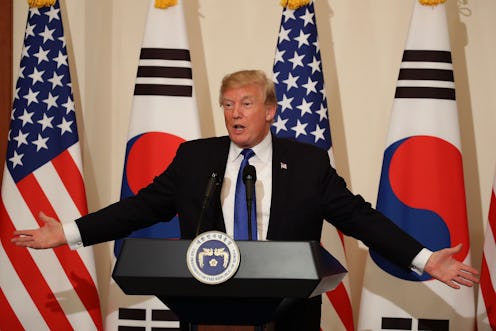News
Why Trump's Latest North Korea Move Could Be Really, Really Bad For America

On Nov. 20, President Trump announced that North Korea was again being designated as a state sponsor of terror after the country was removed in 2008 under President George W. Bush for meeting nuclear weapons inspection requirements. With Iran, Sudan, and Syria also being on the list administered by the State Department, exactly what does being a state sponsor of terror mean?
The move is meant to curb Pyongyang's pursuit of nuclear weapons, but Mike Fuchs, senior fellow at the Center for American Progress, tells Bustle that the designation is a "step backward" and will make diplomacy with North Korea more difficult.
"It's a purely symbolic move by the Trump administration to show that it's being as tough as possible when it comes to North Korea, but in practice the U.S., with the recent legislation that Congress passed in August and the designation from the U.N. Security Council, can already impose massive wide sanctions on the North Korean economy as well as against other countries doing business with North Korea," Fuchs says. "North Korea will see it as another sign that the Trump administration will be less likely to come to the table with the interest in making a deal."
During a Cabinet meeting on Monday, Trump said the decision "should've happened a long time ago" and claimed the move will add pressure on the “murderous regime” to “end its unlawful nuclear and ballistic missile development.” Trump added that Pyongyang will face the “highest level of sanctions by the time it’s finished" and that the designation will be formalized on Tuesday.
Trump pointed to the assassinations ordered by North Korea dictator Kim Jong-Un, and the death of Otto Warmbier, an American student who died in June when he was released by North Korea after spending 17 months in captivity. Warmbier was sentenced to 15 years of hard labor after being detained in the Pyongyang airport in January 2016 and was released to his family in "severe" condition.
Sanctions for North Korea and the other nations on the list include: "restrictions on U.S. foreign assistance, a ban on defense exports and sales, certain controls over exports of dual use items, and miscellaneous financial and other restrictions," according to the U.S. Department of State. In Oct., House members wrote to Secretary of State Rex Tillerson urging him to add North Korea to the list, citing the murder of Kim Jong-Nam, Kim Jong-Un's older brother. Jong-Nam was killed in February reportedly on the assassination orders of the North Korean regime, according to The New York Times.
"Such acts are not isolated events, but part of a consistent pattern by the Kim regime," said the letter, signed by Rep. Edward Royce (R-Calif.) and Rep. Eliot Engel (D-N.Y.).
Relations between the U.S. and North Korea have been fraught ever since President Trump took office. Trump has constantly tweeted about North Korea's threat to the U.S. because the nation continues to pursue nuclear weapons and test ballistic missiles. During Trump's 12-day Asia trip this month, the president issued a warning to North Korea while addressing the South Korean National Assembly.
"Today, I hope I speak not only for our countries, but for all civilized nations, when I say to the North: Do not underestimate us. And do not try us,” Trump said.
In response, a state-run North Korean newspaper called Trump an “old lunatic” on Sunday and derided his visit to South Korea as “nonsense.” The commentary also warned that the U.S. would regret "letting such a depraved and stupid guy occupy the Oval Office."
North Korea first tested intercontinental ballistic missiles capable of reaching Alaska in July, and claims to have successfully tested a hydrogen bomb. Trump has sparred publicly with the North Korean leader, referring to Kim Jong-Un "Little Rocket Man" and more recently, calling him "short" and "fat" on Twitter. A North Korean newspaper then responded to Trump's remarks on Nov. 15 by sentencing the president "to death" for insulting the "dignity of the supreme leadership."
When it comes to designating North Korea as a state sponsor of terror, Fuchs believes it's just going to pile up with everything else that's happened. "I think the downside here outweighs the benefits because it will send another bad signal that the Trump administration is not interested in diplomacy," he says.